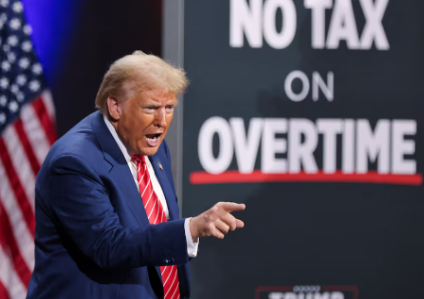
The Republican Presidential Candidate, Donald Trump, has firmly centred his campaign as a referendum on providing relief for economic issues that he imputes to Biden's administration. While the promises of tax cuts on Social Security Benefits, higher tariffs on imports, and increased spending on national security have appeased those voters who remain wary of high price levels, a deeper analysis reveals a not-so-desirable scenario in the long run. Following the 9.06% inflation peak in 2022 owing to trillions of dollars being injected into the economy, coupled with no plans of recovering this deficit, the inflation rate has now been on a steady decline and close to the Fed's 2% estimation as per the recent Reuters report. Though inflation seems to be tamed, people still feel its aftershock in the increased prices of goods. Capitalising on this sentiment, Trump has assured a series of economic reforms, which several analysts have deemed inconsequential. The Fiscal Deficit currently stands at a staggering 1.8 trillion dollars per the official U.S. statistics, posing a solid threat to the government's ability to combat economic downturns. Reducing fiscal deficit primarily entails increased tax rates and reduced government spending. However, one look at Trump's economic agenda discloses a contrasting picture. He has promised reduced corporate tax rates and tax cuts on personal income. These policies will bring him voters who look at short-term gains, but in the long run, decreased revenues from taxes will widen the fiscal deficit. More importantly, the Fed has worked towards bringing down inflation with high short-term interest rates, but the widening fiscal deficit will increase these rates in the near future. In matters of defence, Trump has had a history of over-the-budget spending, which again plays into the issue of pilling debt. Further, removing income taxes on Social Security Benefits will undercut the medical trust funds that are already dwindling. His stance on tariff rates has been constant, imposing a 10-20% tariff on all overseas imports and a 60% tariff on imports from China. He says this will balance the proposed tax deductions and help local businesses. Such a policy would, however, only benefit if the U.S. were a self-sufficient economy in all aspects. The country remains highly dependent on food and energy imports, both of which will bear the consequences of increased prices. The domestic producers might also hike their prices to match those of the imported goods. Trump's initial goal to reduce the value of the U.S. dollar to boost exports also stands challenged, as higher tariffs will only increase the dollar value. Internationally, such a decision will significantly affect trade relations with major economies, either restricting U.S. exports or retaliating with similar impositions. While the economic promises made by Trump might have undesirable outcomes, the policies advocated by Kamala Harris, the Democratic Party Nominee, have led to her facing 'communist' allegations. To consolidate votes, particularly those of Black Americans who are now tipping towards Donald Trump, Harris has announced millions of dollars in subsidies and forgivable loans on housing, healthcare plans and small businesses, the cost of which will be offset by taxing the rich and increasing corporate tax rates. Such a move could disincentivise the key drivers of the U.S. economy. For instance, the decision to ban excessive pricing by grocery stores might be well-received among consumers, but such regulations usually lead to market shortages in a capitalist economy. Though Harris has constantly addressed social issues, the uncertainty around her financial stance might put her behind in the presidential race. The present global scenario is marked by several free-trade agreements among Western countries and India in efforts to alienate China and strengthen their domestic economies. Given the recent polls, there is a chance that the November elections might favour the Republican party, so it is crucial now, more than ever, to see how Trump's economic policies if implemented, could slow the progress of bilateral relations for the U.S. In addition, it is a safe assumption that China will no longer remain the third-largest market for U.S. exports, which can put a dent in the U.S. economy. Consequently, U.S. might end up paying more than its foreign counterparts for these economic reforms.
The fiscal deficit has risen to 1.8 billion dollars, maintaining its increasing trend. Source: FiscalData
Donald Trump seeks to remove taxes on overtime work among his several other tax cuts. Source: Reuters
01 Nov 2024
Paridhi Minda